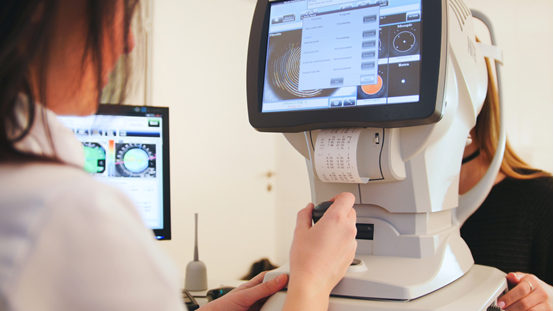
Convenience is king In the new age of digital everything, but are there times when quality becomes the tradeoff for convenience? If you are considering using vision care online instead of going to the eye doctor, there are some advantages and disadvantages. The tradeoff might not be as much as you would expect, however. State-of-the-art technology is allowing people to get the same quality virtually as they would in person.
Nothing is worse than reaching for your last pair of contact lenses only to find that you are all out of them and need a new prescription. In everyone’s hurried lives, the last thing that people’s schedules allow for is an eye exam appointment. The good news is that now you don’t have to make an appointment, sit, wait and pay an exorbitant amount for an eye exam. New companies such as GlassesOn, Essilor, and Opternative are bringing the exam to you via the internet.
If you are worried about the quality of the exam you receive, Opternative goes one step further and sends your results to an ophthalmologist who is licensed in your state, so they can read through the exam and review it before you are issued a new prescription for either contact lenses or glasses.
Although many question whether an internet exam can be as comprehensive and accurate as going to the eye doctor, the system has been tested and the results are that both yield the same accuracy. The only thing that an internet exam can’t check for is things like a slight astigmatism, when the eye can’t evenly focus incoming light. An astigmatism can lead to blurry vision and may sometimes go undetected by the online exams.
Because of its convenience, the telemedicine field is gaining momentum around the nation. It isn’t just about being more convenient, however; when you put medical services on the internet, you are allowing many underserved areas and demographics, an option they haven’t had in the past, which is likely increasing access to things like eye care.
Why professionals are skeptical
There are some concerns that professionals have expressed when it comes to online eye care. The measurement for glasses is completely comprehensive, and there isn’t much difference between the online exam and the in-office version. What is different is the quality of the overall exam. There are many things that an online portal can’t tell you about the overall health of your eyes. Exams to measure other eye concerns or conditions are completely missed on an online test.
Ophthalmologists can see things in person that the internet equivalent can’t. As they are able to access the eyes in person, they know how to spot signs of glaucoma, early stages of eye disease and even things like diabetes. Therefore, although they’re a viable alternative to get a new eye prescription for lenses and glasses, online exams don’t completely override the need to see a doctor on a regular and consistent basis.
The origins of online exams
The idea of online eye exams is not new. In fact, it has been in the works since 2009, and technology has finally allowed it to become a reality. Originally developed by an optometrist, the need was there to reach populations that couldn’t keep up with their prescriptions or who were foregoing eye care altogether due to limitations in their schedule and insurance coverage. Not many insurance companies include vision care, which is why many don’t go for regular exams and have outdated prescriptions that aren’t good for them.
Convenience is king
Having an eye exam is as simple as going to a website or your mobile device. Once you have set up an account and entered all your information, the app takes you through a series of exams that evaluate the way that your eye responds to various stimuli.
Technology and the internet have simplified many things that were once time-consuming and arduous. The new wave of telemedicine is not going away anytime soon. Getting your eye exam and prescription lenses online is a good alternative to an in-office visit, but it won’t completely do away with the need to see an ophthalmology professional to ensure the health of not just your vision, but your eyes themselves. There will likely always be some human benefit that technology will never breach.
